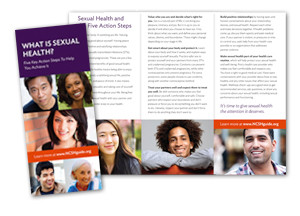By David Lee on September 29, 2015
Sexual Health and Sexual Violence Prevention Belong Together
This blog was written by Deena Fulton who until recently worked as Prevention Training and Technical Assistance Coordinator at the California Coalition Against Sexual Assault and PreventConnect. She recently moved to start a new position with the North Carolina Coalition Against Domestic Violence.
Recently, I had the privilege to present on a panel on sexual violence prevention at the annual meeting of the National Coalition for Sexual Health (NCSH). National Sexual Violence Resource Center‘s resident preventionista, Jen Grove, and Dr. Lee Beers of Children’s National Medical Center joined me on the panel, and NSVRC’s Laura Palumbo moderated. Together, we were able to paint a picture of the prevalence and effects of sexual violence and reproductive coercion, as well as describe the approach we take and strategies we use in our primary prevention work.
The NCSH members were very interested in sexual violence prevention and how it intersects with the various kinds of work they’re doing in the sexual health field. Many folks asked challenging questions that got right to the core of how sexual health promotion and sexual violence prevention can enhance and support each other. We talked about going beyond education about what consent looks like to include promoting skills on recognizing and respecting a “no,” and how sexual violence prevention education can really be universal despite immense challenges in some areas of teaching comprehensive sex education. We also thought about how to be mindful of messaging that might have implications about sexual violence even in documents that may seem unrelated on the surface, like the guide to taking charge of your own sexual health that the coalition is currently working on.
Overall, it was very exciting to see how open our colleagues in the sexual health field are to thinking about the tough questions about how to get sexual violence prevention right, especially in this era when sexual assault is often in the spotlight. We hope to be able to continue these conversations through our work at NCSH and beyond, so that we can continue to support each other with both of our expertise.






Is it possible to order this brochure? Where from?
The brochure is available at http://nationalcoalitionforsexualhealth.org/tools/communicating-to-the-public/public-awareness-materials